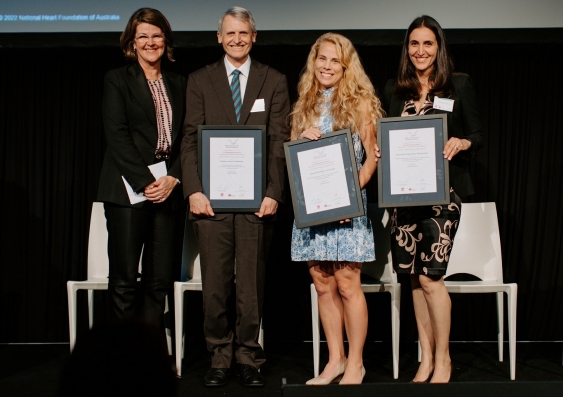UNSW researchers get tick of approval for groundbreaking heart research
2024-10-31T08:49:00+11:00

The Heart Foundation-funded projects champion advancements in the prevention, treatment, and management of heart disease, stroke, and blood vessel disease.
Photo: Adobe Stock
The Heart Foundation funds six UNSW research projects to help save more lives from cardiovascular disease.
The in heart disease research including six grants awarded to five UNSW Medicine & Health academics.
This year's Heart Foundation-funded projects tackle some of the most challenging mysteries in cardiovascular diseases (CVD). They target advancements in the prevention, treatment, and management of heart disease, stroke, and blood vessel disease.
UNSW Dean of Medicine & Health, Professor Cheryl Jones congratulated her colleagues on their success.
“This recognition from the Heart Foundation is a testament to the dedication and innovative spirit of our researchers,” said Prof. Jones. “We are immensely proud of each of them for their outstanding contributions to heart health research. Their work will drive forward new insights and approaches that can improve the lives of countless individuals,” Prof Jones said.
Heart Foundation CEO, David Lloyd congratulated the UNSW researchers and thanked the Foundation’s donors for their support in funding this vital work.
“Cardiovascular disease remains a devastating health issue, claiming the lives of one person every 18 minutes,” he said. “Researchers play a crucial role in working to turn this statistic around. Their work helps us understand the causes, develop more effective treatments, and improve prevention strategies.”
The UNSW recipients are:
Dr Lauren Houston from The George Institute for Global Health is looking to innovate women’s cardiovascular health by combining heart screening with routine mammograms. She received a postdoctoral fellowship.
CVD typically presents differently in women than in men and is under-diagnosed and under-treated. These ‘female’ symptoms can often go overlooked until it’s too late, placing women at higher risk of a major cardiovascular event. Women are also less likely than men to be screened for heart disease by a GP.
Mammograms are already routinely adopted by around 50% of women in high CVD risk age groups, but new technology means they can also yield important new information, such as calcification of the arteries and breast tissue density, that are markers for increased heart disease risk.
Dr Houston’s team will first survey healthcare professionals to assess the feasibility of the plan and then pilot the use of existing breast screening infrastructure to identify women at risk of heart disease.
If successful, the NSW pilot could expand nationally and integrate with the existing mammogram system – effectively delivering a 'two for one' benefit for women across Australia.
Cardiovascular disease remains a devastating health issue, claiming the lives of one person every 18 minutes.
Dr Sara Hungerford from the School of Clinical Medicine has been awarded a postdoctoral fellowship and a two-year Vanguard grant.
Hemodynamic monitoring (monitoring blood flow and pressure) has been shown to improve outcomes and reduce hospital stays for heart failure patients. Currently, these assessments require invasive procedures, which come with risks.
Dr Hungerford’s projects aim to change that by developing a fully non-invasive method using ultrasound and a wrist device to measure blood pressure, combined with custom software.
This research could transform the way we measure cardiovascular hemodynamics in heart failure patients, eliminating the need for invasive tests. If successful, this approach could shift heart monitoring to a safer, non-invasive system that uses modern, integrated technology to assess measure cardiovascular hemodynamics.
Professor Levon Khachigian from the School of Biomedical Sciences received a two-year Vanguard Grant.
Ischaemic heart disease is the leading cause of death in Australia and worldwide. Procedures like percutaneous coronary intervention quickly restore blood flow to the heart, but this sudden restoration can also harm heart tissue, causing cell death, reduced heart function and scarring, which can lead to heart failure. Unfortunately, there is no approved drug to reduce heart damage from this type of injury.
To tackle this, Prof. Khachigian’s team has developed a novel anti-inflammatory drug that, when tested in rats, reduced heart damage, preserved heart function and inhibited scarring. This project brings these findings closer to the clinic by testing whether the agent is cardioprotective in animals given a heart attack when it is delivered orally and if beneficial effects are impacted by time of delivery.
If successful, this project could pave the way for further testing, potentially moving toward use with heart attack patients in emergency settings.
This recognition from the Heart Foundation is a testament to the dedication and innovative spirit of our researchers.
Dr Kathy Trieu from The George Institute for Global Health, recipient of the Future Leader Fellowship grant, is scaling up innovative interventions to improve healthy eating and heart health in Australia.
Poor diet is one of the leading risk factors for death, contributing to around 1 in 5 deaths worldwide, primarily from CVD.
Dr Trieu’s four-year research program will focus on two promising interventions to improve diets and prevent CVD among vulnerable groups. The first will explore the use of potassium-enriched salt among consumers and by food manufacturers to help lower blood pressure and reduce heart disease risk.
The second approach will look at 'Food is Medicine' programs, which allow healthcare professionals to ‘prescribe’ nutritious foods at low or no cost as part of medical treatment and to enable healthy eating, particularly for people experiencing food insecurity (e.g. difficulty accessing or affording foods).
In both cases, the team will seek solutions to challenges in implementing these strategies in a way that is effective and feasible in Australia.
Dr Nelson Wang from The George Institute for Global Health is setting out to answer a critical question – is it better to measure risk factors to best manage heart disease? He received a postdoctoral fellowship.
Optimal management of high cholesterol and high blood pressure (BP) – two big risk factors for heart disease – remains a major challenge in combating CVD, with both issues affecting one in three Australian adults.
Currently, doctors are expected to personalise treatment based on an individual’s measurements, but these can be difficult to quantify as clinicians can be misled by random fluctuations as both cholesterol and BP are intrinsically variable.
To address this, Dr Wang’s team will test the impact of two radically different strategies. One seeks to enhance the quality and frequency of BP and cholesterol testing by providing access to gold standard ambulatory BP monitors and serial lipid measurements. On the flipside, the other will look to minimise testing by using established clinical trial data to guide treatment decisions. By evaluating and comparing the relative effectiveness of these strategies in primary care, the findings will contribute to the design of a larger, randomised clinical trial in the future.
Media enquiries
For enquiries about this story and interview requests please contact Yolande Hutchinson:
Tel: 0420 845 023
Email: y.hutchinson@unsw.edu.au







